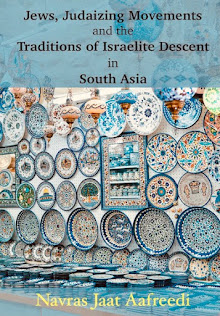
El Dr. Aafreedi, un profesor de estudios judíos y activista
judío-musulmán en relaciones con la India, ha concluido una gira de
conferencias como profesor visitante en Australia recientemente. Esto
sigue a una larga gira de un mes en Israel el verano pasado, durante el
cual asistió y dictó conferencias en varios temas indio-israelí-judío
que ofrece una perspectiva única.
El Dr. Navras Jaat Aafreedi, de treinta años, es profesor adjunto en
el Departamento de Historia y Civilización de la Facultad de Humanidades
y Ciencias Sociales, Universidad de Gautama Buda en Greater Noida, una
ciudad satélite de Nueva Delhi.
Se declara religiosamente no observante. Su madre proviene de una
familia Hindú-Sikh. Su padre es un musulmán no-conformista. Él cree que
su educación en un ambiente de diversidad religiosa, discusión,
comprensión y apreciación, reforzado por el estudio y la empatía,
proporciona un entorno excepcional para sus actividades académicas.
Si bien el estudio de la historia medieval y moderna de la India, se
sintió atraído cada vez más hacia la historia de los Judíos, los
avatares de su lucha por la supervivencia, y sus logros singulares a
pesar de las dificultades aparentemente insuperables. Se dio cuenta de
que la historia de los Judíos en la India debía ser investigada. Su
tesis doctoral se titula “La judería indú y las autoproclamadas “tribus
perdidas de Israel” en la India”.
Él es la primera persona en hacer cualquier contribución a los
estudios judíos en lengua urdu, que es la lengua franca de casi todos
los musulmanes del sur de Asia, que representan la mayor población
musulmana del mundo. Pasó un año estudiando en la Universidad de Tel
Aviv para su investigación post-doctoral en las “tradiciones de
ascendencia israelita entre ciertos grupos musulmanes en el sur de
Asia”. Hizo un estudio socio-histórico de las tres comunidades judías,
los dos movimientos judaizantes, los dos grupos musulmanes que tienen
tradiciones de haber descendido de las tribus perdidas de Israel, y los
dos grupos no judíos con tradiciones de origen judío en la India. La
intención no era establecer la historicidad de los reclamos de origen
israelita que estos grupos hacen, sino explorar el por qué dicen lo que
hacen y qué es lo que hace que algunos de los Judios religiosos los
tomen en serio.
“He seguido con mi investigación en la India, y durante este período
se han entrevistado a un número de clérigos musulmanes, periodistas,
académicos, literatos y estudiantes para conocer sus actitudes hacia
Judios, Israel y el sionismo y para entender lo que da forma a sus
percepciones y cómo un positivo cambio puede llevarse a cabo en sus
actitudes.” “Me llamó la atención el hecho de que a pesar de la ausencia
de los Judios en donde nací, encuentran la frecuente mención en el
discurso musulmán allí, que es invariablemente siempre de naturaleza
negativa. Teorías de la conspiración mundial judía eran comunes, a pesar
de su escaso número. Esto provocó mi interés en ellos.
Cuanto más leía sobre ellos la más mi interés creció. Llegué a
admirar a los Judios por su erudición, resistencia y tenacidad y se
inspiró para tratar de traer un cambio positivo en la actitud de los
musulmanes hacia ellos “, dijo Aaafreedi.
Durante su gira por Israel, el Dr. Aafreedi dio una conferencia en la
Escuela Internacional de Yad Vashem para Holocausto, durante la cual se
llevó a cabo un taller sobre “La educación de la población de la India
sobre Hitler y la Solución Final”.
En cuanto a Israel, Aafreedi dice que siempre ha estado fascinado por
el país que produjo dos de las más grandes religiones del mundo, que a
su vez condujo al Islam. “Me enamoré de Israel durante el año que pasé
allí en 2006-2007 para mi post-doctorado. Lo que me impresiona en
particular, es el espíritu indomable de los israelíes, sus logros
asombrosos en la cara de las adversidades y obstáculos combinados con su
entusiasmo por la vida.”
Fuente:infopublico.com








.jpg)
















